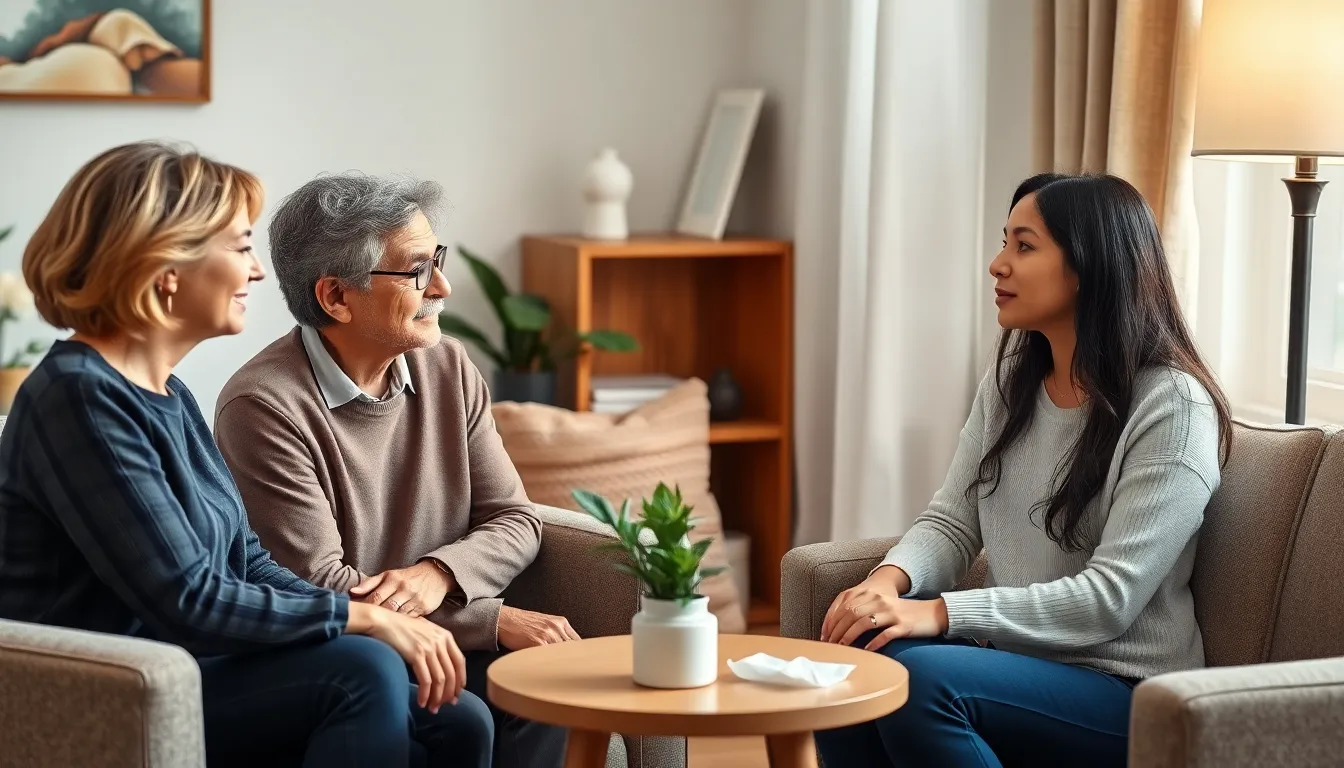Divorce can feel like a rollercoaster ride without the safety harness. One minute you’re soaring high on love, and the next, you’re plummeting into a pit of confusion and heartache. But don’t worry—divorce counseling is here to help navigate those wild twists and turns. It’s like having a GPS for your emotional journey, guiding you through the maze of feelings, decisions, and maybe even a few awkward moments.
In a world where relationships can sometimes resemble a game of Jenga, divorce counseling offers a chance to rebuild from the ground up. Whether it’s learning how to communicate without resorting to interpretive dance or finding closure without an elaborate farewell party, professional guidance can turn chaos into clarity. Let’s explore how divorce counseling can transform the end of one chapter into a new beginning, with a sprinkle of humor and a whole lot of heart.
What Is Divorce Counseling?
Divorce counseling involves professional therapy aimed at assisting individuals and couples through the emotional difficulties of divorce. This type of counseling targets unresolved feelings, communication barriers, and the overall adjustment process related to ending a marriage.
Therapists guide clients in exploring their emotions, addressing grief, and managing conflict. In many cases, participants find clarity regarding their feelings, making informed decisions about their futures.
Counseling sessions can provide a safe space for discussing fears, anxieties, and doubts surrounding the divorce process. Trust fosters open dialogue, enabling individuals to express their concerns without judgment.
Many clients appreciate the strategies taught during these sessions. Techniques for effective communication can significantly enhance interactions with former partners, especially important when children are involved.
Furthermore, divorce counseling emphasizes personal growth and healing. Clients develop coping mechanisms that prepare them for life post-divorce, transforming challenges into opportunities for self-discovery.
Many people benefit from both individual and couples counseling, depending on their specific needs. Individual counseling focuses on personal feelings, while couples counseling may address mutual concerns and facilitate amicable resolutions.
Overall, divorce counseling plays a vital role in helping individuals navigate the emotional complexities of divorce, fostering healing and encouraging healthier relationships moving forward.
The Importance of Divorce Counseling


Divorce counseling provides essential support during a challenging period. Individuals navigate complex emotions, and this professional guidance can make a substantial difference.
Emotional Support for Individuals
Emotional support emerges as a cornerstone of divorce counseling. Clients experience various feelings, including grief, anger, and confusion. Therapists help individuals unpack these emotions, equipping them with coping strategies to manage stress effectively. Regular counseling sessions establish a safe environment for sharing thoughts. In this space, clients express themselves without judgment, leading to deeper self-understanding. Strategies learned during therapy also promote resilience, aiding individuals in reclaiming their sense of identity. Through this supportive process, personal growth and healing become possible, empowering them to move forward positively.
Guidance for Co-Parenting
Guidance for co-parenting represents another critical aspect of divorce counseling. Navigating shared parenting can be challenging, especially when emotions run high. Counselors provide techniques for effective communication between former partners. Clients learn to prioritize their children’s needs, focusing on maintaining a stable environment. Conflict resolution strategies foster healthier interactions and minimize negative impacts on children. Counselors also assist in creating parenting plans that reflect shared responsibilities, ensuring clarity and consistency. By working collaboratively, parents enhance cooperation, ultimately nurturing a supportive atmosphere for their children amidst the divorce.
Types of Divorce Counseling
Divorce counseling comes in various formats, each tailored to different needs during a divorce. Understanding these types helps individuals select the best approach for their situations.
Individual Counseling
Individual counseling focuses on personal emotional healing. Clients explore feelings of grief, anger, and confusion in a safe environment. Therapists guide discussions, allowing clients to unpack their emotions effectively. Sessions enable individuals to identify personal coping strategies that foster resilience. Techniques learned often assist clients in making informed decisions about their future paths. Tailored therapeutic approaches address unique needs, promoting personal growth and clarity amidst turbulent emotions.
Couples Counseling
Couples counseling aims to improve communication between partners during the divorce process. This type of therapy helps each individual express feelings and concerns clearly. Facilitated discussions allow couples to work through unresolved issues, making the separation smoother. Conflict management strategies provide tools for respectful interactions, especially when children are involved. Therapists assist in creating agreements and plans that prioritize co-parenting dynamics, promoting cooperation beyond the divorce.
Group Therapy
Group therapy offers a supportive environment where individuals share experiences with others facing similar challenges. Participants benefit from collective insights, gaining varied perspectives on their emotions and situations. The shared journey fosters a sense of community and reduces feelings of isolation. Facilitators encourage open dialogue, helping members develop their coping strategies collaboratively. Learning from one another’s experiences can empower individuals to navigate their own divorce processes with greater confidence.
Benefits of Divorce Counseling
Divorce counseling offers essential support during a challenging time, equipping individuals with valuable tools for personal growth. Clients experience numerous advantages as they navigate their feelings and decisions.
Improved Communication Skills
Effective communication becomes a primary focus in divorce counseling. Clients learn how to express their thoughts clearly and assertively. Counselors emphasize active listening techniques, allowing individuals to understand their former partner’s perspectives better. Enhanced communication skills reduce misunderstandings and foster collaboration, particularly vital for co-parenting situations. Clients often find that improved dialogue helps them articulate their needs and boundaries, leading to healthier interactions post-divorce.
Conflict Resolution Strategies
Conflict resolution strategies form another key benefit of divorce counseling. Counselors provide tailored techniques to address and resolve disputes that arise during the divorce process. Clients practice identifying triggers that escalate conflicts, empowering them to manage emotions constructively. Developing these strategies leads to more effective negotiations, enabling individuals to reach agreements amicably. Ultimately, mastering conflict resolution fosters a more peaceful environment, especially during co-parenting, benefiting both parents and children.
Challenges in Divorce Counseling
Divorce counseling faces several challenges that can affect its effectiveness. Understanding these issues helps clients navigate their emotional journeys more effectively.
Stigma Around Seeking Help
Stigma often surrounds the concept of seeking help through divorce counseling. Many individuals view counseling as a sign of weakness or failure. This perception can stop them from pursuing necessary support, leading to prolonged emotional distress. Fear of judgment from friends and family may compound these feelings, creating additional stress. Moreover, societal beliefs about self-reliance might discourage individuals. Overcoming this stigma is crucial for clients to engage fully in the counseling process and embrace healing.
Resistance to Change
Change can provoke strong resistance during divorce counseling. Clients may cling to familiar patterns, making progress difficult. Attachment to past relationships often hinders them from moving forward. Even when they’re aware of the need for change, fear of uncertainty may hold them back. Comfort in their current situation often outweighs the potential benefits of new approaches. Counselors may encounter reluctance to adopt new coping strategies. Addressing these feelings is essential for promoting personal growth and facilitating emotional healing.
Conclusion
Divorce counseling offers invaluable support during one of life’s most challenging transitions. By addressing emotional turmoil and fostering effective communication, it empowers individuals to navigate their feelings and decisions with clarity. The strategies learned in counseling not only enhance personal growth but also promote healthier interactions with former partners, especially in co-parenting scenarios.
As clients explore their emotions and develop coping mechanisms, they can transform the end of a relationship into a new beginning. Seeking professional guidance can alleviate feelings of isolation and fear, paving the way for healing and renewed hope. Embracing the journey of divorce counseling can ultimately lead to a more positive and fulfilling future.
